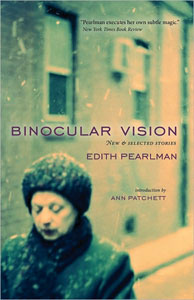Binocular Vision: New and Selected Stories (Lookout Books, 2011) Edith Pearlman’s collection of short stories, “Binocular Vision,” was selected as the best work of fiction of 2012 by the National Book Critics Circle. Although this 76-year-old author has been winning awards for her fiction since the beginning of her career, she is virtually unknown to the general reading public. This is truly a shame.
Edith Pearlman’s collection of short stories, “Binocular Vision,” was selected as the best work of fiction of 2012 by the National Book Critics Circle. Although this 76-year-old author has been winning awards for her fiction since the beginning of her career, she is virtually unknown to the general reading public. This is truly a shame.
“Binocular Vision” consists of 34 short stories, each of which is a small masterpiece, and many of which have won individual prizes. Many of the stories are set in the fictional Boston suburb of Godolphin, a community reminiscent of Brookline where Pearlman makes her home. However, there are also stories set in Latin America, in middle Europe and three particularly moving stories that follow a middle-aged American Jewish woman. In the first story, set in London, she works with a Jewish agency, assisting with the resettlement of refugees from Europe and children from the kindertransport. In the second story, she is in a European DP camp for Jewish survivors after the war; and in the final story, she is living in New York, now married to the man who recruited her for all these acts of charity.
Each of Pearlman’s stories creates real characters, people you know and care about. Often her protagonists are lonely individuals seeking some small relationship with a fellow human being. “How to Fall” introduces the second banana in a newly popular TV comedy revue. He has one fan, but that is enough to give him a reason to continue.
Another story features a retired gastroenterologist dealing with her own diagnosis of cancer. In another, a little girl, given a pair of binoculars, spies on her neighbors but gets their story entirely wrong. In what may have been, inadvertently the funniest story — and Pearlman’s stories are not funny, but insightful and moving — a weekly congregation get-together called “Torah study” is actually a weekly poker game.
Perhaps one of the most memorable stories is “Vaquitqa” about the Jewish Minister of Health in an unnamed Latin American country. The Minister survived the Holocaust in Czechoslovakia, hiding in a barn with only a cow for companionship. She knows the regime in her country is getting dangerous and she expects to be arrested any day — hoping she will only be deported, not executed. In the meantime she continues to run her ministry and worry about the health of the citizens of the country.
In sum, this exquisitely written collection of stories is like a necklace of beautiful jewels. Each story reflects the light in a different way. Each story radiates different colors. Each character the reader encounters reminds you of someone you may have known slightly and wished to know better. Reading these stories gives you an opportunity to get to know characters worth knowing.
Andrea Kempf is a retired librarian who speaks throughout the community on various topics related to books and reading.


